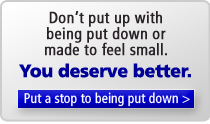Comparing Yourself to Someone More Successful Just Might Destroy You
 You know those dark moments you have? Those moments when you’re not thinking at your best when you might look at someone more successful than you and think, “Great. Just look at that. They’re so far ahead of me, why am I even bothering? I’ll never have what they have.”
You know those dark moments you have? Those moments when you’re not thinking at your best when you might look at someone more successful than you and think, “Great. Just look at that. They’re so far ahead of me, why am I even bothering? I’ll never have what they have.”
Comparing yourself to someone more successful than you achieves nothing, and it may just destroy you. Here’s why.
-
Your judgement and decision making becomes flawed.
Comparing yourself to someone more successful is comparing 2 very different things. Apples and oranges. Bagpipes and banjos. Pumas and pandas. In comparing 2 very different things you start picking over the craziest of details and making them relevant. And when the wrong things become relevant, your ability to make great decisions gets confused and compromised. You start instead of growth. -
You’re competing for the wrong reasons.
I don’t think there’s anything wrong with having a competitive spirit, but you gotta pick the right event to compete in. If you’re motivated by overtaking someone else the reasons for you being in the game become completely lost. You’re competing for glory, not for meaning. -
You’ll start believing that you’re less than.
Keep comparing yourself with others and you’ll establish all sorts of reasons why they’re better than you – or in other words, why you’re less than. Keep occupying yourself with those reasons and it’s easy to start believing them, and before you know you’re thinking and behaving as though you’re less than in all parts of your life. -
You end up being type-cast.
Once you’re in the habit of comparing yourself unfavourably to others, you end up casting yourself in the role of victim, the hard-done-by or the struggler. Stepping into that role becomes a habit, something known, familiar and something you can trust. You brain triggers the pattern of behaviour that it knows the best, and so struggling becomes more important than using your true capability and value to make something extraordinary happen. -
You become bitter.
When you’re giving fuel to the sense of lack, it’s easy to start resenting those who are successful rather than being pleased for them, celebrating with them or even learning from them. Your world view dims and your spirit becomes diminished. You end up resenting the success of others and even enjoying it when they screw up. You become bitter that they have something you don’t.
I get that our society seems to instil competition and comparison into us from a young age, but you can’t blame society for the way you think any more than I can blame the aliens for sneaking into my house in the middle of the night and injecting me with a parasitic life-form that makes me crave gooey cheese and alt-folk.
Who’s the Boss of You?
You’re in charge of the way you think, and the way you think determines your experience and the level of meaningful success you achieve. A couple of pointers for you.
- Just because you’re where you are and they’re where they are doesn’t make them any better or you any worse. You’re still you and I happen to think you’re pretty brilliant.
- I don’t have a competitive bone in my body when it comes to others, but I’m fiercely competitive with myself. I know what I’m capable of and I know how I am when I’m performing at my best – that’s my yardstick. Compete with yourself, not someone else.
- There’s always someone with more. You can’t be in front of the world all the time. Nobody can.
So if you ever have those moments when you look at someone else and feel like stamping your foot and shouting “Damn it, I deserve better“, it’s okay. A lot of folks do.
But be sure to catch yourself and notice how your mind’s working, then replace that thought with, “Damn it, I can be better.”
- Other articles you might like:
- Why Are You Comparing Yourself to Others?
- Solo-lifers: Why Successful Women Remain Single
- If I Had my Way, the World Would Explode
 To paraphrase Dr “Bones” McCoy from Star Trek, “Damn it man I’m a coach not a psychology Professor“.
To paraphrase Dr “Bones” McCoy from Star Trek, “Damn it man I’m a coach not a psychology Professor“. Sometimes in life people walk all over you.
Sometimes in life people walk all over you.





